人教版英语初中九年级上册知识讲解,巩固练习(教学资料,补习资料):Unit 10 You’re supposed to shake hands. 第2课时Section B(含答案解析)
文档属性
| 名称 | 人教版英语初中九年级上册知识讲解,巩固练习(教学资料,补习资料):Unit 10 You’re supposed to shake hands. 第2课时Section B(含答案解析) |
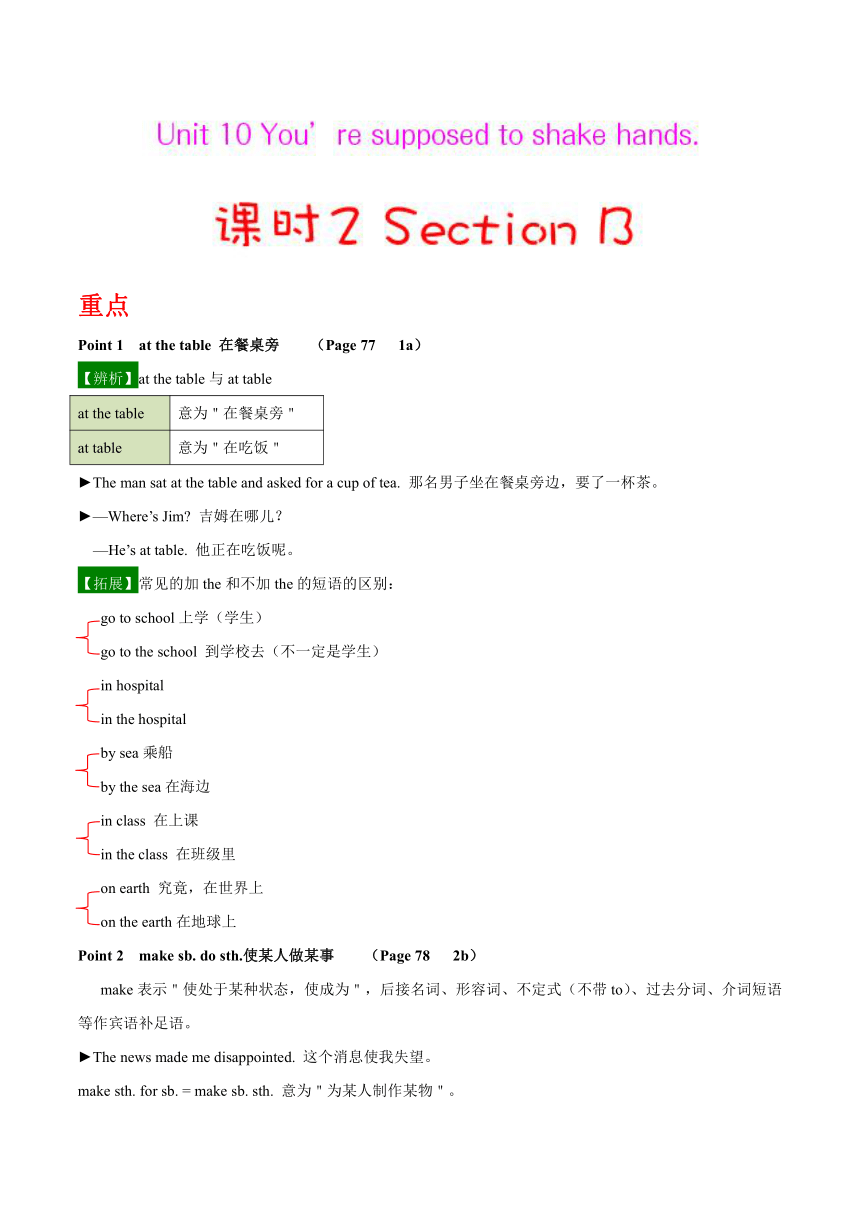
|
|
| 格式 | zip | ||
| 文件大小 | 158.2KB | ||
| 资源类型 | 教案 | ||
| 版本资源 | 人教新目标(Go for it)版 | ||
| 科目 | 英语 | ||
| 更新时间 | 2019-09-21 00:00:00 | ||
图片预览

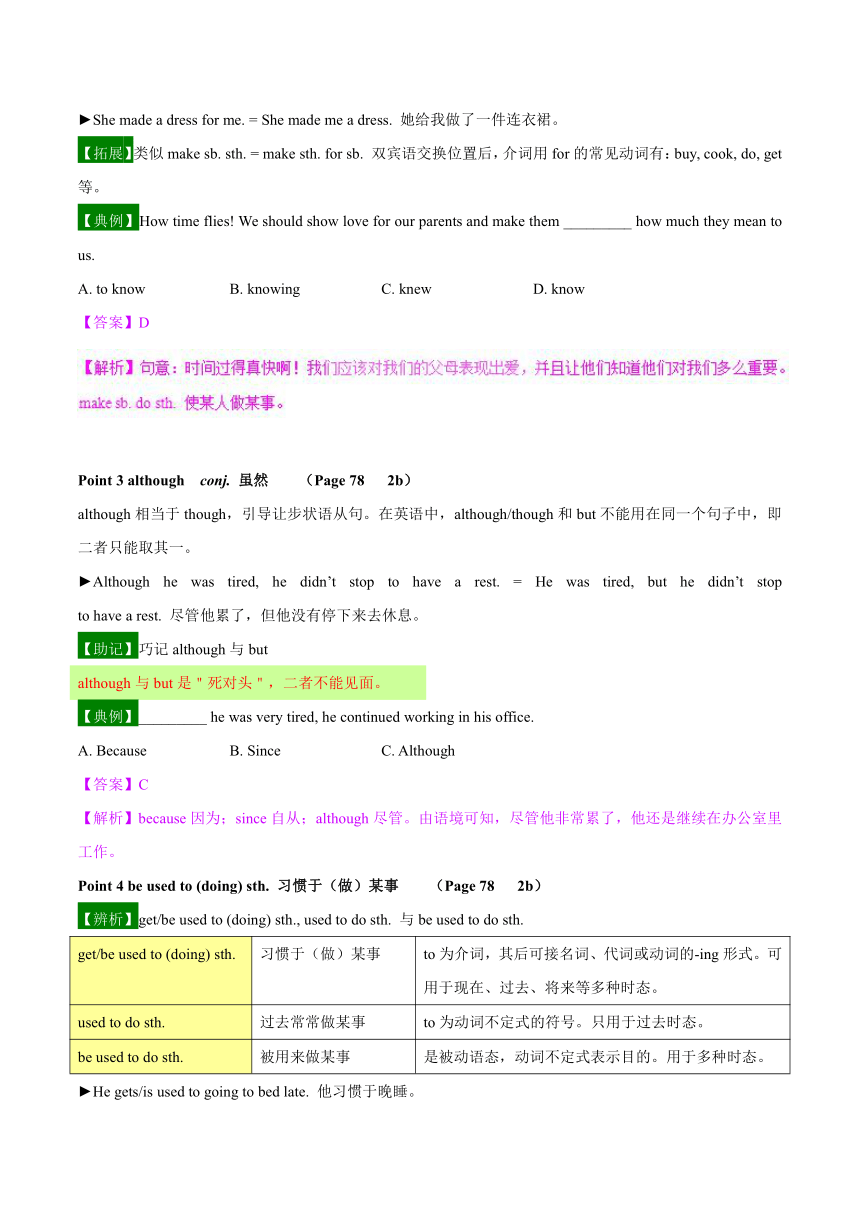
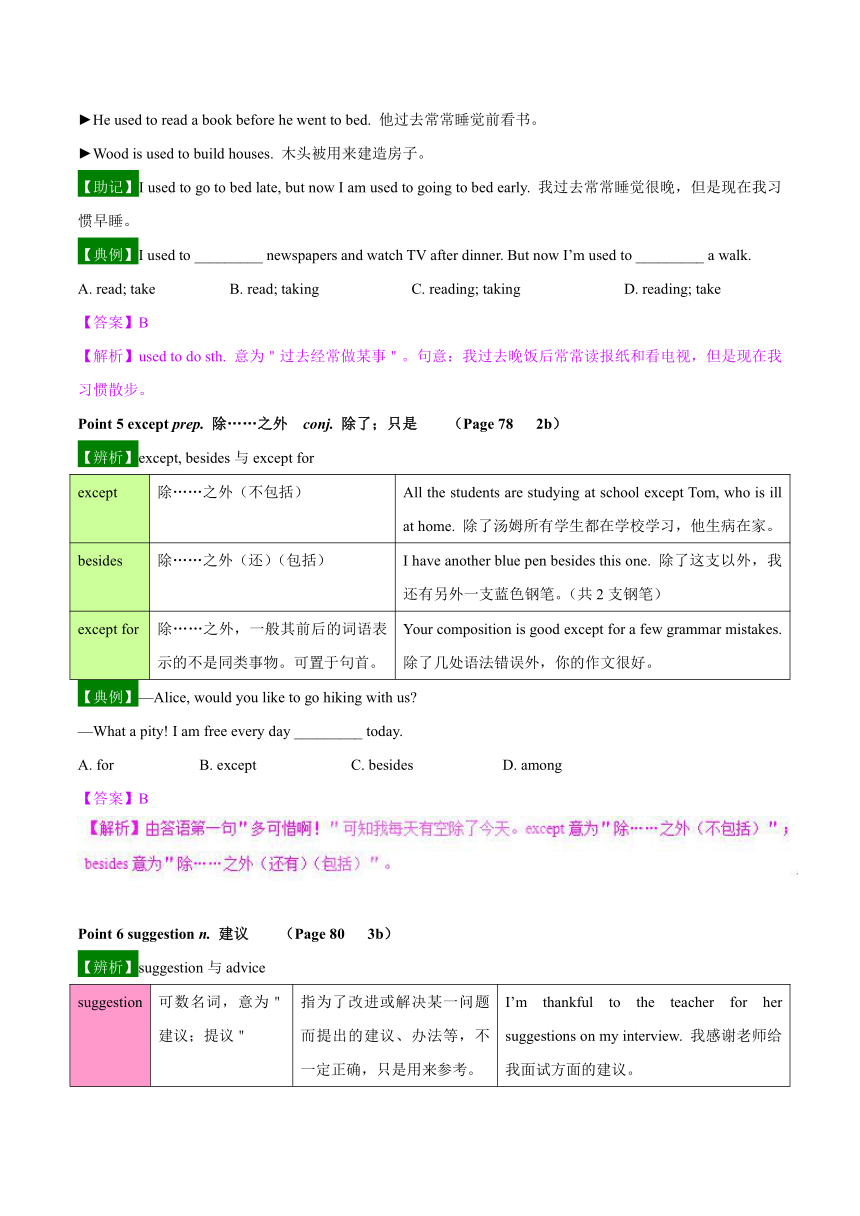
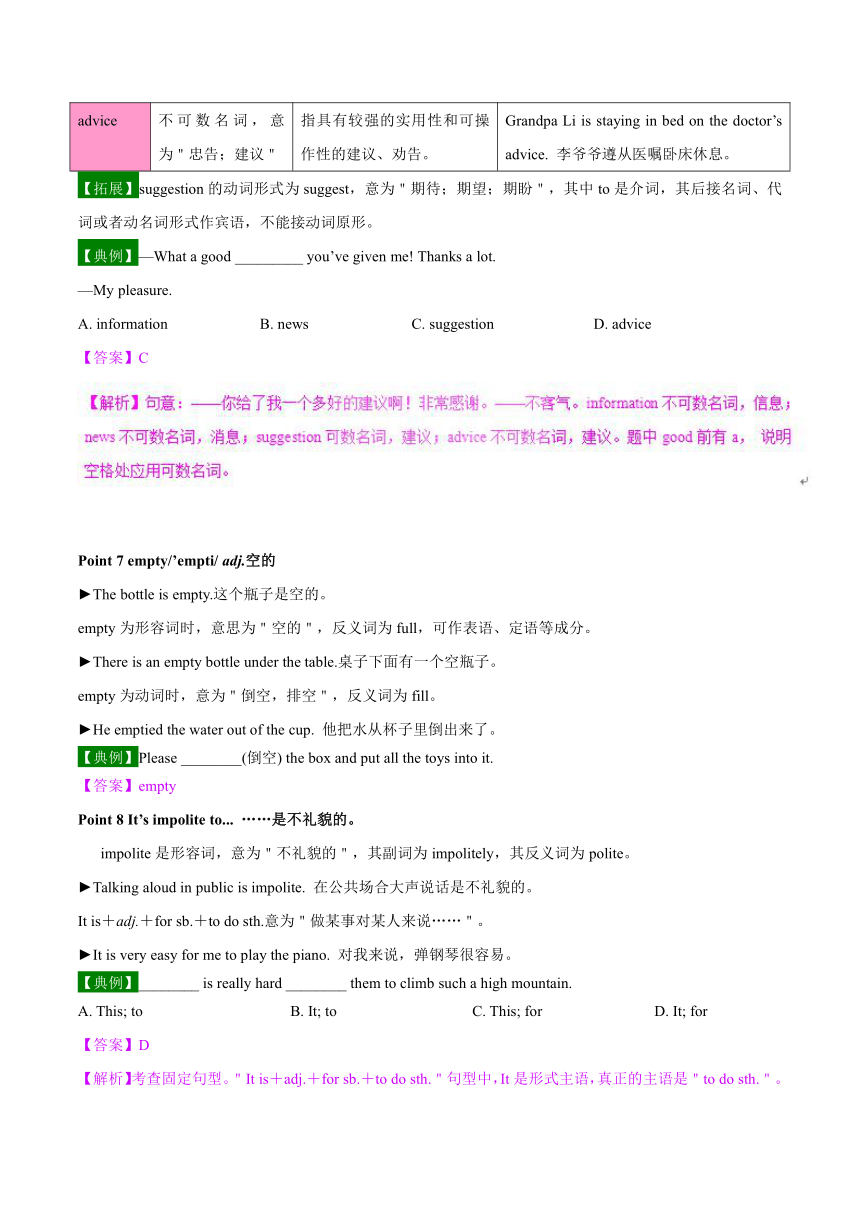
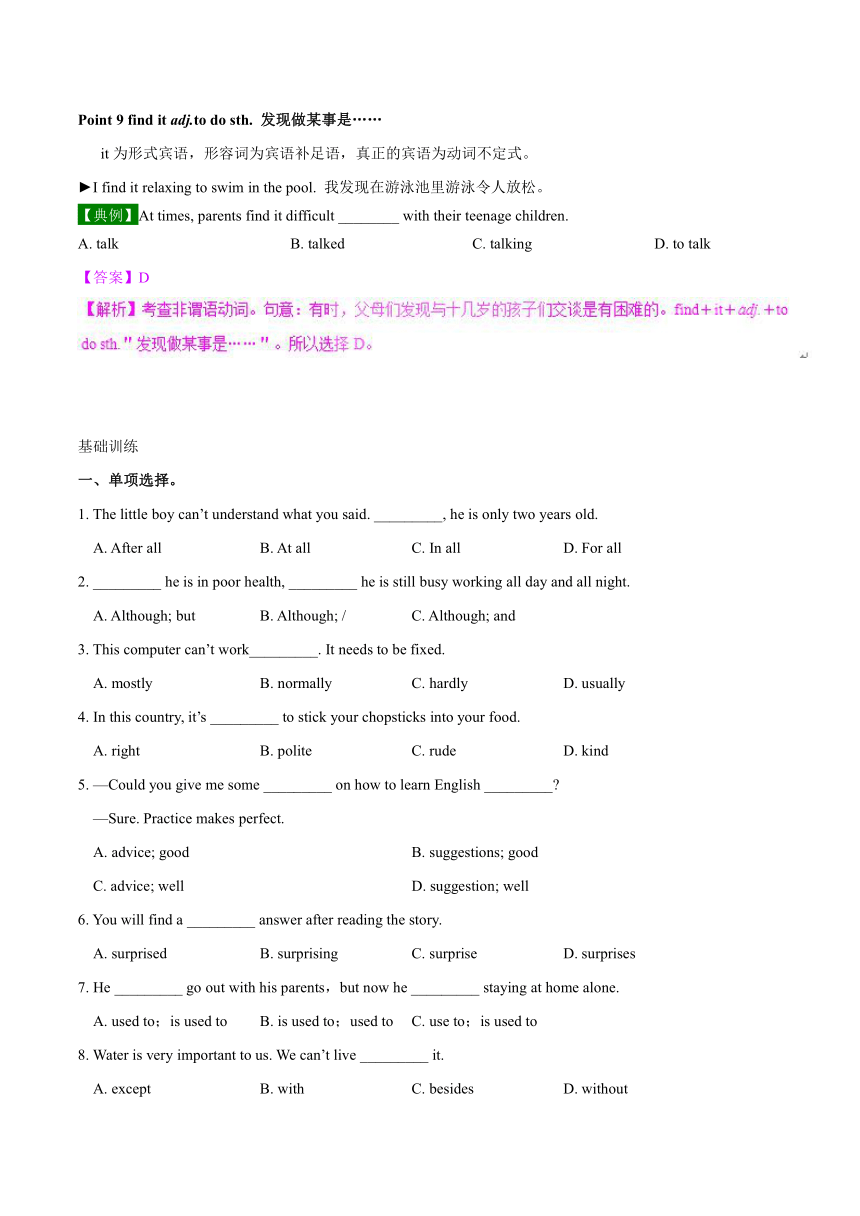
文档简介
重点
Point 1 at the table 在餐桌旁 (Page 77 1a)
【辨析】at the table与at table
at the table
意为"在餐桌旁"
at table
意为"在吃饭"
?The man sat at the table and asked for a cup of tea. 那名男子坐在餐桌旁边,要了一杯茶。
?—Where’s Jim? 吉姆在哪儿?
—He’s at table. 他正在吃饭呢。
【拓展】常见的加the和不加the的短语的区别:
go to school上学(学生)
go to the school 到学校去(不一定是学生)
in hospital
in the hospital
by sea乘船
by the sea在海边
in class 在上课
in the class 在班级里
on earth 究竟,在世界上
on the earth在地球上
Point 2 make sb. do sth.使某人做某事 (Page 78 2b)
make表示"使处于某种状态,使成为",后接名词、形容词、不定式(不带to)、过去分词、介词短语等作宾语补足语。
?The news made me disappointed. 这个消息使我失望。
make sth. for sb. = make sb. sth. 意为"为某人制作某物"。
?She made a dress for me. = She made me a dress. 她给我做了一件连衣裙。
【拓展】类似make sb. sth. = make sth. for sb. 双宾语交换位置后,介词用for的常见动词有:buy, cook, do, get等。
【典例】How time flies! We should show love for our parents and make them _________ how much they mean to us.
A. to know B. knowing C. knew D. know
【答案】D
Point 3 although conj. 虽然 (Page 78 2b)
although相当于though,引导让步状语从句。在英语中,although/though和but不能用在同一个句子中,即二者只能取其一。
?Although he was tired, he didn’t stop to have a rest. = He was tired, but he didn’t stop to have a rest. 尽管他累了,但他没有停下来去休息。
【助记】巧记although与but
although与but是"死对头",二者不能见面。
【典例】_________ he was very tired, he continued working in his office.
A. Because B. Since C. Although
【答案】C
【解析】because因为;since自从;although尽管。由语境可知,尽管他非常累了,他还是继续在办公室里工作。
Point 4 be used to (doing) sth. 习惯于(做)某事 (Page 78 2b)
【辨析】get/be used to (doing) sth., used to do sth. 与be used to do sth.
get/be used to (doing) sth.
习惯于(做)某事
to为介词,其后可接名词、代词或动词的-ing形式。可用于现在、过去、将来等多种时态。
used to do sth.
过去常常做某事
to为动词不定式的符号。只用于过去时态。
be used to do sth.
被用来做某事
是被动语态,动词不定式表示目的。用于多种时态。
?He gets/is used to going to bed late. 他习惯于晚睡。
?He used to read a book before he went to bed. 他过去常常睡觉前看书。
?Wood is used to build houses. 木头被用来建造房子。
【助记】I used to go to bed late, but now I am used to going to bed early. 我过去常常睡觉很晚,但是现在我习惯早睡。
【典例】I used to _________ newspapers and watch TV after dinner. But now I’m used to _________ a walk.
A. read; take B. read; taking C. reading; taking D. reading; take
【答案】B
【解析】used to do sth. 意为"过去经常做某事"。句意:我过去晚饭后常常读报纸和看电视,但是现在我习惯散步。
Point 5 except prep. 除……之外 conj. 除了;只是 (Page 78 2b)
【辨析】except, besides与except for
except
除……之外(不包括)
All the students are studying at school except Tom, who is ill at home. 除了汤姆所有学生都在学校学习,他生病在家。
besides
除……之外(还)(包括)
I have another blue pen besides this one. 除了这支以外,我还有另外一支蓝色钢笔。(共2支钢笔)
except for
除……之外,一般其前后的词语表示的不是同类事物。可置于句首。
Your composition is good except for a few grammar mistakes. 除了几处语法错误外,你的作文很好。
【典例】—Alice, would you like to go hiking with us?
—What a pity! I am free every day _________ today.
A. for B. except C. besides D. among
【答案】B
Point 6 suggestion n. 建议 (Page 80 3b)
【辨析】suggestion与advice
suggestion
可数名词,意为"建议;提议"
指为了改进或解决某一问题而提出的建议、办法等,不一定正确,只是用来参考。
I’m thankful to the teacher for her suggestions on my interview. 我感谢老师给我面试方面的建议。
advice
不可数名词,意为"忠告;建议"
指具有较强的实用性和可操作性的建议、劝告。
Grandpa Li is staying in bed on the doctor’s advice. 李爷爷遵从医嘱卧床休息。
【拓展】suggestion的动词形式为suggest,意为"期待;期望;期盼",其中to是介词,其后接名词、代词或者动名词形式作宾语,不能接动词原形。
【典例】—What a good _________ you’ve given me! Thanks a lot.
—My pleasure.
A. information B. news C. suggestion D. advice
【答案】C
Point 7 empty/’empti/ adj.空的
?The bottle is empty.这个瓶子是空的。
empty为形容词时,意思为"空的",反义词为full,可作表语、定语等成分。
?There is an empty bottle under the table.桌子下面有一个空瓶子。
empty为动词时,意为"倒空,排空",反义词为fill。
?He emptied the water out of the cup. 他把水从杯子里倒出来了。
【典例】Please ________(倒空) the box and put all the toys into it.
【答案】empty
Point 8 It’s impolite to... ……是不礼貌的。
impolite是形容词,意为"不礼貌的",其副词为impolitely,其反义词为polite。
?Talking aloud in public is impolite. 在公共场合大声说话是不礼貌的。
It is+adj.+for sb.+to do sth.意为"做某事对某人来说……"。
?It is very easy for me to play the piano. 对我来说,弹钢琴很容易。
【典例】________ is really hard ________ them to climb such a high mountain.
A. This; to B. It; to C. This; for D. It; for
【答案】D
【解析】考查固定句型。"It is+adj.+for sb.+to do sth."句型中,It是形式主语,真正的主语是"to do sth."。
Point 9 find it adj.to do sth. 发现做某事是……
it为形式宾语,形容词为宾语补足语,真正的宾语为动词不定式。
?I find it relaxing to swim in the pool. 我发现在游泳池里游泳令人放松。
【典例】At times, parents find it difficult ________ with their teenage children.
A. talk B. talked C. talking D. to talk
【答案】D
基础训练
一、单项选择。
1. The little boy can’t understand what you said. _________, he is only two years old.
A. After all B. At all C. In all D. For all
2. _________ he is in poor health, _________ he is still busy working all day and all night.
A. Although; but B. Although; / C. Although; and
3. This computer can’t work_________. It needs to be fixed.
A. mostly B. normally C. hardly D. usually
4. In this country, it’s _________ to stick your chopsticks into your food.
A. right B. polite C. rude D. kind
5. —Could you give me some _________ on how to learn English _________?
—Sure. Practice makes perfect.
A. advice; good B. suggestions; good
C. advice; well D. suggestion; well
6. You will find a _________ answer after reading the story.
A. surprised B. surprising C. surprise D. surprises
7. He _________ go out with his parents,but now he _________ staying at home alone.
A. used to;is used to B. is used to;used to C. use to;is used to
8. Water is very important to us. We can’t live _________ it.
A. except B. with C. besides D. without
9. They usually plan to do_________, or go somewhere together.
A. interesting something B. anything interesting
C. interesting nothing D. something interesting
10. I was supposed to _________ 8:00, but I was late.
A. arrive at B. reach at C. get at D. arrive in
二、句型转换。
1. You are supposed to shake hands in the United States.(对画线部分提问)
________ _______ you_______ _______ ______in the United States.
2. You aren’t supposed to make sounds while eating.(改为同义句)
You ________ _________ sounds while eating
3. Everyone went to America, but Lin Tao didn’t go.(改为同义句)
Everyone to America Lin Tao.
4. Should I shake hands or bow? (改为同义句)
Am I _________ __________ shake hands or bow?
5. It is impossible that such a little child can dress himself.(改为同义句)
It is impossible _________ _________ _________ __________ _________ to dress himself.
三、完成句子。
1. To learn English well is very important. (改为同义句)
_________ very important _________ learn English well.
2. Millions of people speak English as their second language. (改为被动语态)
English _________ _________ by millions of people as their second language.
3. 他不知道在哪能找到一个笔友。(完成译句)
He doesn’t know where _________ _________ a penpal.
4. I’m going to Shanghai by plane next month. (同义句转换)
I’m _________ _________ Shanghai next month.
5. 每个人都很确定学好英语是重要的。
Everyone knows _________ _________ that it is important to learn English well.
四、用所给词的适当形式填空。
1. The teachers like writing with ________(chalk).
2. How many ________(season)are there in a year?
3. You ____________ (expect)to kiss each other when you meet someone in France.
4. He lives in the ________(north) part of the city.
5. A truck ________(knock) him down last week.
五、从方框中选单词或短语并用其适当形式填空。
as soon as, be supposed to, to one’s surprise, value, kiss,
shake hands, table manners, relax, after all, get mad
1. We ________________ greet others in the right way.
2. ________________________, his father bought a new watch for him last night.
3. I ________ the time I spend with my family.
4. Do you know about________________ of any other country?
5. Keep on your dream.____________, you are young.
6. I will visit Beijing____________ I am free.
7. You’re supposed to ____________________ when you meet someone for the first time.
8. Work hard,or your father will_______________________.
9. The music is ________________________________. I like it very much.
10. In Colombia, it is polite for girls ________ each other on the side of the face.
能力测试
一、完形填空。
Jane had two children to raise. She had to pay for the housing and 1 clothes. She had a lot of bills. She worked in a 2 every day and got $600 a week. Even when she was 3 , she went to work.
Jane worked hard and did a great job. She depended on tips (小费) to help her get enough money to pay the bills.
One night, after Jane had served dinner to a family, 4 left a big tip on the table. It was
5 . Jane was taking care of another family at their table. When she turned back, she found the money had been 6 .
Jane saw a woman at another table staring at her when she 7 the restaurant. Jane went to ask her what food she wanted. She 8 just a sandwich. She did not leave a tip after eating and Jane heard that she paid with a $20 bill. Jane was sure the woman had stolen her 9 , but she couldn’t prove (证明) it.
The next night, the 10 woman came into the restaurant. She gave Jane $50. She said, "I was so sorry I took your money last 11 . I had a bad day. Someone stole my wallet. So I was angry. So I took your money. 12 that was not right. People should 13 good things. Not bad things. So I want you to take the money."
"I’ll take the $20 but you keep the 14 . I know you need it," said Jane.
"You should have called the police," the manager said to Jane.
Jane said, "No. We should forgive (原谅) when someone says 15 and wants to make it right. We should try to help each other."
1. A. buy B. design C. make D. wash
2. A. bookstore B. hospital C. restaurant D. school
3. A. angry B. afraid C. happy D. tired
4. A. he B. she C. we D. they
5. A. $20 B. $30 C. $40 D. $50
6. A. handed in B. taken away C. given back D. thrown out
7. A. looked at B. looked around C. looked after D. looked for
8. A. ordered B. made C. sold D. served
9. A. book B. money C. dinner D. wallet
10. A. old B. beautiful C. same D. strange
11. A. night B. week C. month D. year
12. A. And B. But C. So D. Or
13. A. accept B. borrow C. cook D. share
14. A. money B. promises C. rest D. words
15. A. hello B. thanks C. goodbye D. sorry
二、阅读理解。
A
A man and his little son spent their summer vacation walking through the mountains far from their city. One day, the little boy slipped 20-30 meters down the side of the mountain. Finally he was able to grab onto a tree branch and hold on.
"Help me!" he cried out.
"Help me!" a voice shouted back.
The boy was very surprised. "Who are you?" he shouted.
"Who are you?" the voice shouted back.
"You are a fool!" he said.
"You are a fool!" the voice came back.
At that moment, his father got to him. "Someone is talking to me but I can’t see who he is," the boy said to his father.
"Son, that is called an echo(回音)," his father said. "But really, it’s called life."
"You are a winner!" the father cried.
"You are a winner!" the voice answered.
"You are talented!" the father shouted.
"You are talented!" it came back.
"Son, that’s how life is. Whatever you do, it always comes back to you," the father said. "The question is: what are you sending out about? Please start sending out: ‘I am strong, I am talented, and I am the best.’ What you send out is going to come back to you."
If you want more love in the world, create more love in your heart. Life will give you back everything you have given to it.
1. The man and his son spent their _________ in the mountains.
A. weekends B. summer vacation C. winter vacation D. Christmas holiday
2. What happened to the boy?
A. He could not find his father.
B. He fell down from a tall tree.
C. He slipped down the mountain.
D. He got lost in the mountains.
3. When the boy shouted "Who are you?", the voice said _________.
A. "Help me." B. "Who are you?" C. "You are a fool." D. "I am the best."
4. The boy thought the voice came from __________
A. himself B. his good friend in his city
C. his father D. someone in the mountain
5. What’s the best title of this story?
A. Life is like an echo. B. Have you ever heard an echo?
C. Everybody needs help. D. Do you like climbing mountains?
B
Before the elevator was invented in the late 1800s, buildings were much smaller and lower,as people did not want to walk up and down stairs(楼梯) all day. With the invention of the elevator came high-rise buildings and skyscrapers.
Some people find elevators make them a little uncomfortable because there are many people all standing close in a small room. It is best just to relax and enjoy the ride.
When the elevator doors open, stand aside and let everyone out before you try to get in. Even if you are in a hurry,it’s impolite to push someone so that you can get into an elevator.
Don’t stare at(盯着看) people or stand too close. Try to keep your eyes looking ahead or you could make others feel nervous or uncomfortable.
If you have to move past people to get out of the elevator, say"Excuse me,please"or"I’m sorry"rather than just push them out of the way. Others will think you’re welcome if you show some politeness.
If you are standing close to the buttons(按钮), ask others what floors they are going to and press the buttons for them. This is considered to be polite.
In case of emergency(紧急情况), follow the instructions written inside the elevator and try to keep others calm.
6. The elevator was invented________.
A. in 1800 B. in 1899
C. in the 18th century D. in the 19th century
7. Before the elevator was invented, buildings were ________.
A. big enough B. tall enough
C. low and small D. huge but low
8. The underlined word "skyscrapers" means "________"in Chinese.
A. 天窗 B. 摩天大楼 C. 天桥 D. 冲天火箭
9. According to the passage, if you stare at someone in an elevator, he or she may feel________.
A. uncomfortable B. angry C. strange D. calm
10. If you have an emergency in an elevator, you should________.
A. cry for help loudly B. knock on the door loudly
C. follow the elevator instructions D. call the police for help
C
I think it is safe to say that snakes are not popular among most people. It would be hard to find a person who is neutral(中立的), or simply doesn’t care one way or the other. What I wonder is why something even without legs causes such great fear.
Snakes are quite useful, but that doesn’t seem to matter. Snakes help control the population of mice. Without snakes, perhaps we would find mice everywhere. Most of us, however, would rather see a mouse than a snake.
The poison argument(毒性的争论) is a strong one. Some snakes are poisonous, and this causes people’s death. However, the poisonous snakes are only a small number. We can’t say all the snakes are bad just because of a few dangerous ones.
And what do we do with the people who really like snakes? They like snakes even more strongly than we dislike them. These people learn about them, find them out, and watch them carefully. Why? The only reason I can think of is that these people are open-minded. They are able to put aside differences and welcome the snake as a friend.
Whatever the reason for our like or dislike, snakes do something good in the circle of life. They would prefer to be left alone, and that is what we should do. If you’re lucky, you might not run across more than a few of them in a lifetime. That would be fine with most of us.
11. How does the writer describe the appearance of snakes?
A. Something even without legs. B. Something not popular among people.
C. A person who is neutral. D. A person who cares about nothing.
12. Which of the following shows that most people dislike snakes?
A. They welcome snakes as their best friends. B. They would rather see a mouse than a snake.
C. They wonder why snakes can cause great fear. D. They learn about snakes and watch them carefully.
13. Although some snakes are poisonous, _________.
A. they cause many people’s death B. they control the population of mice
C. they are not dangerous to people D. they are only a small number
14. People who really like snakes are open-minded because they _________
A. are able to put aside differences
B. think all the snakes are poisonous
C. are able to deal with poisonous snakes
D. take part in the poison argument
15. The last paragraph seems to tell us that the writer _________.
A. dislikes snakes B. has the best luck
C. loves snakes D. prefers to be left alone
真题练习
1. (2019? 青海西宁中考)Mille’s mother _________ her to be a great dancer like her.
A. hopes B. warns C. wants D. makes
2. (2018 ? 绥化中考)Can you give me some _________, please?
A. message B. suggestion C. advice
3. (2019 ? 齐齐哈尔中考)Everyone in my class except Tom and Mary _________ to Beijing.
A. have been B. have gone C. has been
4. (2019 ? 湖北宜宾中考)My sister _________ be lazy. But now she’s working really hard.
A. used to B. is used to C. was used to
参考答案
基础训练
一、单项选择。
3. B【解析】句意:这台电脑不能正常工作了,它需要修理了。由题意可知答案为B。
4. C【解析】句意:将筷子插在食物里在这个国家是不礼貌的。因此答案为C。
5. C【解析】some后要用可数名词suggestion的复数形式,可先排除D;表示"学好英语"要用well来修饰learn,故答案为C。
6. B【解析】answer是名词,前面用形容词修饰;surprised一般作表语,surprising既可作定语也可作表语。句意:读完故事后,你会发现一个令人惊讶的答案。
7. A【解析】be used to do"被用来做……";be used to doing"习惯做……";used to do"过去常常做……"。根据句意"他过去常和他父母出去,但是现在他习惯独自待在家里"可知选A。
8. D【解析】句意:水对于我们非常重要,没有水我们无法生存。
9. D【解析】形容词修饰不定代词应放在不定代词的后面;肯定句中一般用something。
10. A【解析】teach,get和arrive三个词,只有arrive可以单独使用,后面不跟地点,首先排除B和C,在具体某一时刻前应该用介词at。
二、句型转换。
三、完成句子。
1. It’s, to【解析】考查同义句。To learn English well中动词不定式作主语可以转换成It’s +形容词+to do表示做某事是……。结合题意故填It’s , to。
2. is spoken【解析】考查被动语态。主动语态变被动语态主动语态的主语变成被动语态的宾语,谓语动词用be done 的结构;根据题意故填is spoken。
3. to find【解析】考查疑问词+不定时短语。 根据题意可知用疑问词+to do ;故答案to find。
4. flying to【解析】考查同义句。Go to sw by plane=fly to sw表示飞往某地;根据题意和汉语提示故答案flying to。
5. for certain【解析】考查固定词组。Know for certain表示确定,根据题意故填for certain。
四、用所给词的适当形式填空。
1. chalk 2. seasons 3. are expected
4. northern 5. knocked
五、从方框中选单词或短语并用其适当形式填空。
1. are supposed to 2. To his surprise
3. value 4.table manners
5. After all 6. as soon as 7. shake hands
8. get mad 9. relaxing 10. to kiss
能力提升
一、完型填空。
文章大意:这篇短文是通过Jane在餐馆里发生的一个故事来告诉人们人与人之间要学会宽容和谅解,应该互相帮助。
1. A【解析】考查动词与语境理解。A. Buy买;B. Design设计; C. Make制作;D. Wash洗。句意:她不得不为房子和买衣服付钱。根据句意及题干分析她有两个女儿,在房租和买衣服方面花销很大。故选A。
3. D【解析】考查形容词与语境理解。A. Angry生气;B. Afraid害怕; C. Happy高兴;D. Tired疲劳。句意:即使她很累的时候也去工作。根据句意及语境可知她有很多的账单要付,所以她努力工作,即使很累也去工作,故选D。
4. D【解析】考查代词与语境理解。 A. he 他;B. She她;C. We我们;D. They他们。句意:一天晚上在Jane为一家人吃饭服务完之后,他们在桌子上留下了一大笔小费。根据句意及题干分析此空指代上文这一家人,所以用they,故选D。
5. A 【解析】考查数词与语境理解。A. $20 20美元;B. $3030美元;C. $40 40美元;D. $5050美元。句意:是20美元。根据下文 She did not leave a tip after eating and Jane heard that she paid with a $20 bill.可知小费是20美元,故选A。
6. B【解析】考查动词词组与语境理解。A. handed in上交;B. taken away带走,拿走;C. given back 归还;D. thrown out扔出去。句意:当她回来时发现钱已经被拿走了。根据句意及语境是钱被别人拿走了,故选B。
7. B【解析】考查动词词组与语境理解。A. looked at看;B. looked around向周围看;C. looked after照顾;D. looked for寻找。句意:当Jane向参观周围看的时候她看到另一个桌子上一个女人在盯着她。根据句意及语境是Jane向餐馆周围看,故选B。
8. A【解析】考查动词与语境理解。A. Ordered订,点菜;B. Made制作;C. Sold卖;D. Served服务。句意:她只点了一个三明治。根据句意及语境此空是点菜的意思,故选A。
9. B【解析】考查名词与语境理解。A. Book书;B. Money钱;C. Dinner饭;D. Wallet钱包。句意:Jane确信这个女人偷了她的钱,但她无法证明。根据句意及语境此题应选B。
10. C【解析】考查形容词与语境理解。A. Old老的;B. Beautiful美丽的;C. Same同样的;D. Strange奇怪的。句意:第二天晚上同一个女人走进了餐馆。根据语境可知是还是那个女人走进了餐馆,故选C。
11. A【解析】考查名词与语境理解。A. Night晚上;B. Week周; C. Month月;D. Year年。句意:对不起,我昨晚拿了你的钱。根据语境可知是昨天晚上的事情,所以选A。
14. C【解析】考查动词与语境理解。A. Money钱;B. Promises诺言; C. Rest休息,剩余的;D. Words话。句意:我会拿20美元,你留下其余的,我知道你需要。根据句意及语境此题应选C。
15. D【解析】考查名词与语境理解。A. hello问好;B. thanks感谢;C. goodbye再见;D. sorry对不起。句意:当别人说对不起并且改正的时候我们应该原谅。根据句意及语境此题应选D。
二、阅读理解。
A
文章大意:本文主要讲述了一个小男孩的爸爸用实践交给了儿子生活就像是回音,如果你对这个世界有更多的爱,在你的心中就会创造更多的爱。生活会回报你所给予它的一切。
1. B【解析】细节理解题。根据A man and his little son spent their summer vacation walking through the mountains far from their city.可知,那位男士和他的小儿子在度过暑假。故选B。
2. C【解析】细节理解题。根据One day, the little boy slipped 20-30 meters down the side of the mountain.可知,有一天,小男孩向山下溜了20-30米。故选C。
3. B【解析】细节理解题。根据The boy was very surprised. "Who are you?" he shouted. "Who are you?" the voice shouted back. 可知,回音也是Who are you?故选B。
4. D【解析】细节理解题。根据"Someone is talking to me but I can’t see who he is," the boy said to his father.
可知,小男孩认为山里有人在喊他。故应该选D。
5. A【解析】主旨大意题。本文主要讲述了一个小男孩的爸爸用实践交给了儿子生活就像是回音,如果你对这个世界有更多的爱,在你的心中就会创造更多的爱。生活会回报你所给予它的一切。故选A。
B
6. D【解析】结合第一段中的"…the elevator was invented in the late 1800s…"可知答案为D。
7. C【解析】结合第一段中的"Before the elevator was invented in the late 1800s,buildings were much smaller and lower…"可知答案为C。
8. B【解析】画线的词skyscrapers和high-rise buildings(高楼大厦)是并列成分,故skyscrapers意为"摩天大楼"。
9. A【解析】结合第四段中的"Don’t stare at people or stand too close…or you could make others feel nervous or uncomfortable. "可知答案为A。
10. C【解析】结合最后一段中的"In case of emergency,follow the instruetions written inside the elevator…"可知答案为C。
C
文章大意:本文作者论述了自己对蛇的看法:蛇是安全的;蛇是有用的,它可以控制鼠的数量;只有少数蛇有毒;蛇在生物圈里起着好的作用等等。
12. B【解析】推理判断题。题意:下面哪一个表明许多人不喜欢蛇?A. They welcome snakes as their best friends. 他们把蛇当作最好的朋友;B. They would rather see a mouse than a snake.他们宁愿看到一只老鼠也不愿看到一只蛇;C. They wonder why snakes can cause great fear.他们想知道为什么蛇造成那么大的恐惧;D. They learn about snakes and watch them carefully.他们了解蛇并且认真观察蛇。根据原文"Most of us, however, would rather see a mouse than a snake." 然而,我们大多数人宁愿看到一只老鼠不是一条蛇。故选择B。
13. D【解析】推理判断题。题意:虽然一些蛇有毒,但是什么?A. they cause many people’s death它们使许多人丧命;B. they control the population of mice它们控制着老鼠的数量;C. they are not dangerous to people它们对人不危险;D. they are only a small number它们数量少。根据原文"We can’t say all the snakes are bad just because of a few dangerous ones." 只是因为一些蛇是危险的,我们就说所有的蛇都不好。说明危险的蛇只是少数,故选择D。
14. A【解析】细节理解题。题意:喜欢蛇的人们思想开明因为他们什么?A. are able to put aside differences可以抛弃不同;B. think all the snakes are poisonous认为所有的蛇有毒;C. are able to deal with poisonous snakes能够对付毒蛇;D. take part in the poison argument参加毒性的争论。根据原文"The only reason I can think of is that these people are open-minded. They are able to put aside differences and welcome the snake as a friend." 我能想到的唯一理由是,这些人都是思想开明的。他们能够抛开分歧,欢迎蛇作朋友。故选择A。
15. C【解析】推理判断题。题意:最后一段好像告诉我们作者什么?A. dislikes snakes不喜欢蛇;B. has the best luck 最幸运;C. loves snakes喜欢蛇;D. prefers to be left alone较喜欢单独留下。根据原文"They would prefer to be left alone"他们宁愿独处,此处指的是蛇,而不是作者本人,所以排除选项D。最后一段"Whatever the reason for our like or dislike, snakes do something good in the circle of life."无论我们喜欢或不喜欢的理由是什么,生活中,蛇做了一些好事的。可知作者是站在蛇一边的,所以排除选项A不喜欢蛇;而选项B文章并没有提及作者是否幸运,故也排除,故选择C。
真题练习
2. C【解析】句意:请给我一些建议好吗?本题考查名词。A. message消息,信息,是可数名词;B. suggestion 建议,是可数名词;C. advice建议,是不可数名词。因为该空前有some(一些)故可排除A、B;所以答案是C。
3. C【解析】句意:除了汤姆和玛丽之外,我们班上每个人都去过北京。考查现在完成时。由句意可知句子时态为现在完成时,构成为:have /has+动词过去分词;have been to表示去过某地,已经回来;have gone to表示去了某地,可能在路上,也可能已经到达;根据Everyone in my class except Tom and Mary to Beijing.可知,这里表示除了汤姆和玛丽之外,我们班上每个人都去过北京, 说明去过北京都已经回来了,所以用have been to。本句的主语是everyone,所以助动词用has,故选C。
4. A【解析】句意:我妹妹过去常常很懒,但是现在她真的工作很努力。A. used to do过去常常做某事;B. is used to do被用来做某事(一般现在时态);C. was used to do被用来做某事(一般过去时态)。根据But now she’s working really hard可知过去常常很懒;故选A。
同课章节目录
- Unit 1 How can we become good learners.
- Section A
- Section B
- Unit 2 I think that mooncakes are delicious!
- Section A
- Section B
- Unit 3 Could you please tell me where the restroom
- Section A
- Section B
- Unit 4 I used to be afraid of the dark.
- Section A
- Section B
- Unit 5 What are the shirts made of?
- Section A
- Section B
- Review of Units 1-5
- Unit 6 When was it invented?
- Section A
- Section B
- Unit 7 Teenagers should be allowed to choose their
- Section A
- Section B
- Unit 8 It must belong to Carla.
- Section A
- Section B
- Unit 9 I like music that I can dance to.
- Section A
- Section B
- Unit 10 You're supposed to shake hands.
- Section A
- Section B
- Review of Units 6-10
- Unit 11 Sad movies make me cry.
- Section A
- Section B
- Unit 12 Life is full of the unexpected
- Section A
- Section B
- Unit 13 We're trying to save the earth!
- Section A
- Section B
- Unit 14 I remember meeting all of you in Grade 7.
- Section A
- Section B
- Review of Units 11-14
